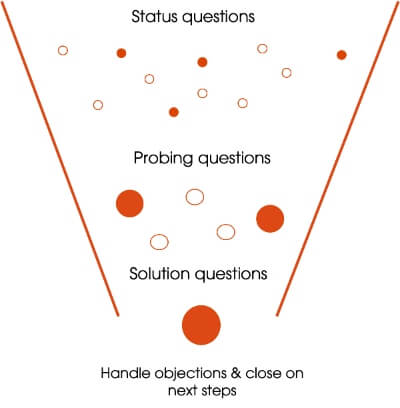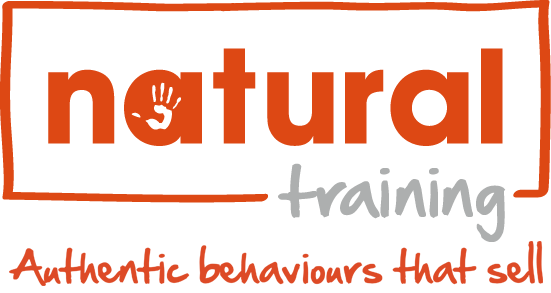Probing Questions: Our Top Six
Probing Questions have the magical effect of re-prioritising issues in the mind of your customer. They are simply brilliant, and a highly coveted skill for any sales person.
It’s hard to sell effectively without understanding your customer’s issues. Issues can create headaches, and headaches create needs, and needs create sales. Sometimes, however, people are not aware they have issues until they are asked a few questions. For example, someone could ask you questions about your health, and in the process, you realise you are in desperate need of a holiday!

What is a probing question?
From time to time during your questioning you will “sniff out” little glimpses of issues that you can dig a bit deeper on to find out more. To use an iceberg analogy, status questions are on the surface level – ‘what they say’ – and probing questions go deeper – ‘what they mean’. They help us to find out issues quicker and with great effect.
Probing questions are below the surface
Why use Probing questions
A Probing question seeks to develop and prioritise customer issues. In some cases, the client won’t know their issues, especially today’s busy decision makers, until you have coaxed them out. This is the beautiful consequence of probing questions – you are not telling the customer; they discover it for themselves.
You need a curious mind and an accurate ear because you might otherwise miss what’s really being said. Great salespeople don’t miss a thing. They pick up on the clues throughout a conversation and probe the customer for more, more, more!
Two great benefits of probing questions
1. Probing uncovers issues:
It’s hard to sell effectively without understanding your customer’s issues. Issues can create headaches, and headaches create needs, and needs create sales. Sometimes, however, people are not aware they have issues until they are asked a few questions. For example, someone could ask you questions about your health, and in the process, you realise you are in desperate need of a holiday. This is the beautiful consequence of probing questions – you are not telling the customer; they discover it for themselves.
2. Probing grows issues:
You have to do more than simply tell a customer what to do. “Telling isn’t selling”. And probing isn’t telling, it’s asking. Done well, great probing questions will enlarge issues in your customer’s mind as you draw their attention to a specific area of interest within the conversation.
Probing questions will help grow pain and develop gain, both of which you want.
When to use probing questions
In the discovery phase with prospects there are 3 broad types of questions you can ask. Questions thrive in structure and the first part of the structure is status questions. These are open-ended questions designed to Help you to seek to understand the client environment. Status questions will help you to identify what the customer already knows, how much they have already researched and what triggered them to start looking around.
Good status questions will uncover answers that need further exploration, that’s where probing questions come in. You need to probe to find out their issues, because if you don’t know what their issues are, then chances are you won’t be able to sell. They help us to find out issues quicker and with great effect. This is so important right now. We are in a phase of low customer time, short customer patience, and highly competitive markets. We need to be curious, and to probe, and uncover – quickly!
Our Top Six Probing Questions
There are so many great probing questions you can use with prospects. Here are are absolute top six favourites:
1. “How did that make you feel?”
Customers’ feelings are important – take it from the logical to the emotional for a stronger tie-in to your message.
2. “Could I please have an example of that?”
Examples bring issues to life in the minds of your customers and help you to grow and prioritise them.
3. “May I please clarify one of your points?”
Seeking clarification is not only okay to do, it’s encouraged. Don’t let the opportunity go without clarifying your understanding. You might not be able to have another conversation with the client for weeks or months – make the most of the opportunity now!
4. “What are the implications of (that issue) on your department/team/time?”
Implications or impact is important in business. Like falling dominoes, one small thing can impact another and so on until there is a whole chain of issues to be resolved.
5. “Would I be right in saying that you’re really passionate about (that issue)?”
This type of reflecting probe is very important, as it shows you are listening, and will generate more discussion around a significant issue. It’s a nice change from the usual probing questions too.
6. “That’s interesting – could I hear more about that please?”
A nice, simple probe, but an effective one. Probing isn’t rocket science – it’s a way for you to find out more selling issues. Simple, but important.
And finally…
For the world’s simplest probe, try silence. The act of saying NOTHING can work well to get the information you need.
Probing questions make up one part of our NaturalFlow Questioning Structure we use in our sales training. Contact us today to find out how we can help your team discover more of your clients’ needs.
Editor’s note: This article was originally published at an earlier date and has been updated for comprehensiveness
Got a comment?
Catch us on Social Media and join the discussion!



